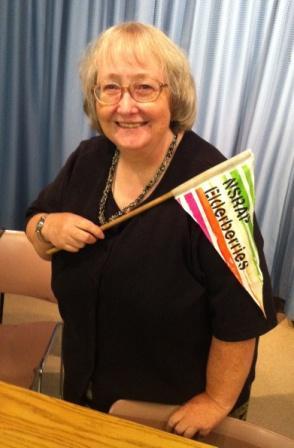Queer communities in smaller centres face both challenges and great opportunities to document their history, a trio of activists and historians told a crowd gathered for a panel discussion at Halifax’s Spring Garden Road Public Library on Tuesday.
The activists agreed that parts of the queer history of Nova Scotia remain hard to pin down because many of the early community leaders chose anonymity and because chunks of the history simply weren’t preserved.
On the other hand, in the smaller communities of Nova Scotia, it can be easier to trace the witnesses and history-makers and compile oral histories.
Daniel MacKay, who publishes Halifax’s queer magazine Wayves, started up the LGBT Halifax Encyclopedia, a wiki where anyone can post articles about the local gay community.
“The goal of the project is to have a page for every person, place, thing and event that is of significance to the Halifax gay community ever,” MacKay says. “We have pages that go back to the 1892 visit of Oscar Wilde to Halifax, and at the other end of the spectrum, when we have a drag event and someone’s crowned Miss Halifax at 1am, by 3am the wiki is updated.”
The modest but surprisingly comprehensive website is a treasure trove of stories from the city’s rich queer history. Everything from an index of present and historical queer-owned businesses in the city to a catalogue of the city’s drag queens is available across more than 1,500 pages. There are even sections for writers to post original fiction and humour.
But MacKay laments the largest gap in his project.
“The biggest hole is the story about how and why the LGBT community in the early ’70s formed,” he says. “There were also a bunch of social parties in people’s houses in the 1960s.”
Lynn Murphy, a part of the Nova Scotia Rainbow Action Project’s Elderberries club, says big chunks of queer history are tucked away in community members’ attics and basements and must be brought to light to be preserved.
“It might be flyers or letters or videotaped rehearsals for a drag show, or the first 15 chapters of an unfinished novel about growing up gay in Ketch Harbour,” she says. “This is gay history and primary sources. The cellar and attic are absolutely the wrong place for them. They are unavailable to the public, they’re vulnerable to damage, and they’re vulnerable to becoming part of an estate. Few heirs are interested in preserving Grandma Sue’s years as a lesbian activist.”
Murphy suggests that people donate these artifacts of queer history to a community archive.
“In an archive, the documents will be protected, and they’ll provide a catalogue for searching the materials. Researchers will be able to use your materials to create books and articles,” she says.
Unfortunately, Nova Scotia does not have an archive dedicated to gay and lesbian history.
Murphy suggests that gay and lesbian artifacts can be donated to the municipal or provincial general archives, university or religious organizations’ archives where relevant, or donated to the Canadian Lesbian and Gay Archives in Toronto.
St Mary’s University historian James Morrison says collecting oral histories from queer community members is also an important tactic for preserving queer history.
“Oral history is inclusive history. It’s being used by historians to include people who’d been left out of history. Forty years ago if you went to the archives, you’d end up with only rich white men. Oral history has opened it up to anyone who wants to know about their past,” he says.
Oral histories can also plug the gaps in records that do currently exist. At one point, MacKay noted that there are lots of preserved minutes from activist group meetings where those attending don’t have last names, prompting Murphy to out herself as one of those members.
“Until I retired there were things I would not do. I would not go on TV. I would be ‘Lynn M,'” she says. “Once I was off the job and my parents had died, I didn’t have anything to give up. But that was only four years ago.”


 Why you can trust Xtra
Why you can trust Xtra


